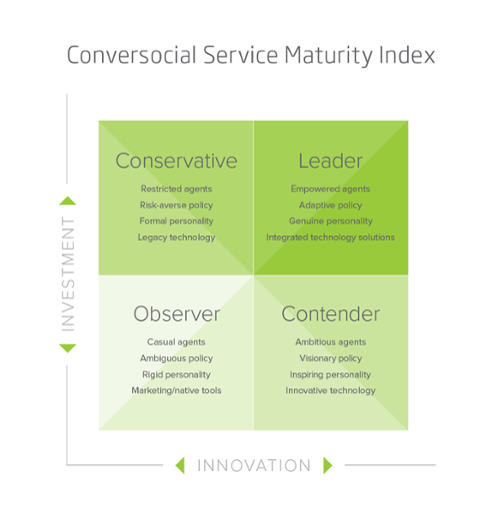— September 16, 2017
Conservatives are those companies who have achieved high investment but low innovation in social care. There are a number of reasons why companies might end up here but most often it’s due to legacy systems, internal bureaucracy, and a lack of executive awareness or interest in social care. While these brands have the capacity to invest heavily in social care tools and to deploy specialized teams of agents, they’re unable to make the best use of them. This category often includes large companies in regulated environments, such as Finance and Insurance.
Let’s look more closely at the characteristics of socially Conservative brands.
How Conservatives can benefit from becoming more socially maturity:
- A happier more motivated team of social care agents
- Decrease public venting by adopting private messaging channels
- Impact the bottom line by diverting care issues from traditional channels to social
Here’s the Social Maturity Index once more:

The characteristics of Socially Conservative Brands:
1. Restricted agents
Conservative organizations typically have many layers of process management which can restrict their agents from providing effective social service. Even if armed with the correct tools, their templated responses can ring hollow and customers will grate under their unwillingness to innovate and help them find resolution. It also, more often than not, leads to the customer being diverted to a traditional channel to seek full issue resolution. Not great for the consumer or the business, especially when McKinsey found that customers who start and end their service journey on social have a satisfaction rate 15 percentage points higher than those that are deflected to traditional from social channels.
2. Risk-averse policy and formal personality
Large organizations are typically more risk averse and thus disinclined to provide the type of personalized social media engagement that their customers crave. Legalese and technical language creep into Conservative support team parlance and agents have a difficult time breaking out of their formal personalities. Yet, break out they must, for consumers expect brands to show some personality on social. Good social service is emphatic, whilst still remaining efficient in resolving the customer’s issue. Less is often more, but the tone in which you say it is important.
3. Legacy technology
At Conservative brands, marketing teams often still control social media tools. Where they own these tools, they’re often shackled by legacy systems that require complex integrations which are owned by many business units and operated and budgeted by IT organizations. At telecommunications companies, for example, there can be many different CRM systems for various wired and wireless product lines; at financial services companies like banks, information security requirements may weigh down the speed of resolution.
How can Conservatives advance to full #SocialFirst leadership?
They key for Conservative care teams is to secure executive interest in social care solutions. It’s with top-down support that they’ll be able to clear out layers of bureaucracy and successfully partner with other business units to define their holistic social care approach.
Find executive sponsorship and innovate
Social maturity within Conservative organizations requires a mindset shift which opens the doors to innovation. Teams, managers, and tools must undergo reorganization to make social care faster and filled with personality, and it takes executive sponsorship to effect this change. Those executives will need to align with their peers to rewrite rules to allow restricted agents to offer customers more creative, personable, and social-friendly resolutions, and to partition social care agents off into a dedicated team.
Create a social care playbook and track performance
This is one case where process can be used to fight process. Unshackle social care agents from their formal personalities with a social care playbook written in tandem with the Marketing and PR teams. This document should identify a clear brand personality, outline the nuances of different social media platforms, and define terms like ‘resolution’ as well as various social-focused key-performance-indicators (KPIs). These KPIs are key to building a case for the ROI of social care.
Invest more heavily in integrations
Social care is measured in minutes, not hours and agents can’t wait for laggy, back-end systems. Invest more heavily in a social care solution with a robust API that can integrate with many different systems in real time. Authenticating customers in-channel is a step in the right direction to solving channel deflection. At Conversocial this capability is called Social Bind. Social Bind offers a way to authenticate customers through private social channels without ever having the customer’s PII (Personally Identifiable Information) pass through the social network.
Conservative organizations can ascend to #SocialFirst leadership if they can eliminate internal barriers to innovation. This means finding sponsorship from executives who understand the value of social care, by defining new brand guidelines and metrics to measure success on social care, and by pushing through the necessary technology hurdles to make the social care system work at scale.
Conservatives who make it through this gauntlet will find themselves among the Contenders in social maturity, but the journey doesn’t end there—Leaders face their own, unique set of hurdles.
Digital & Social Articles on Business 2 Community
(18)




